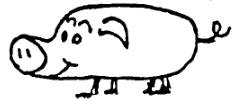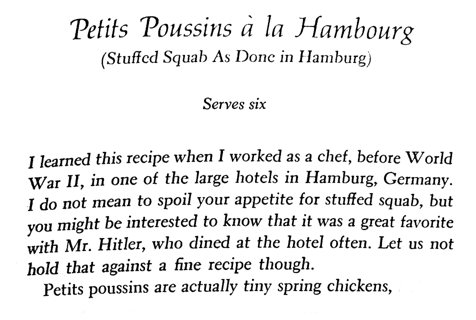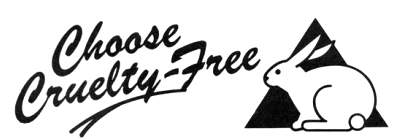
When advocating lifestyles that forlet maximalism, it is important to frame it in a positive way. Settling for simple and coarse things does not need to be a "sacrifice" but something genuinely better than the mainstream alternative.
Specisism is discrimination on the basis of species, oppression and judgment of an animal on the basis of that animal's species or that animal's non-membership in a species. The belief in human superiority over other animals or certain non-human animals' superiority over others.

Animal Rights is the position that non-human animals have rights and inherent value independent of their use.

When advocating lifestyles that forlet maximalism, it is important to frame it in a positive way. Settling for simple and coarse things does not need to be a "sacrifice" but something genuinely better than the mainstream alternative.
| Argument Ad Caninum | |
|---|---|
| Humans have canine teeth, so we're supposed to eat meat. | Most herbivores and omnivores have canines. Canines are not a trait exclusive to carnivores. |
| Appeal to nature | |
| Lions eat other animals in nature. It's the food chain. And we're omnivores. | The lion will quickly perish if they do not eat meat. This is simply not the case with Homo sapiens, who are, anatomically speaking, frugivores. |
| Homo Uber Alles | |
| Non-human animals don't deserve the same rights. | Rights are conventions, not natural laws. We don't have to require non-human animals to have rights in order to take into account their suffering. |
| Whataboutism | |
| There are wars going on and people starving in the world. | Wars and starvation are not aided by animal abuse. In fact, as it requires more crops and resources to farm animals, it could be argued that it is more wasteful and more harmful to those starving. |
| Plants have feelings | |
| How can you kill innocent cabbages and still claim that killing animals is wrong? | This objection concerns the sheer quantity of plants needed to produce meat. Producing a single pound of beef, for instance, requires sixteen pounds of grain. If one is legitimately concerned with mitigating the amount of suffering in the world, then there is simply no way to justify eating meat, especially if one believes that plants also suffer. |
| Happy Meat Fallacy | |
| Isn't it preferable for farm animals to live their lives in the bucolic serenity of verdant fields of clover, galloping insouciantly hither and yon, rather than living in the deplorable squalor and filth of factory farms? Isn't that more humane? More compassionate? More responsible? | While some methods of breeding, enslaving, and slaughtering animas are admittedly less cruel than others, they all involve unpardonable acts of violence against an innocent and defenseless animal who had, in most cases, lived only a fraction of her natural life. |
| The personal choice | |
| Eating is an entirely private matter in which no outside authority should have the right to interfere. | In order for a choice to be entirely personal, all those involved with or affected by it must give their consent. The global animal by-product industry is responsible for environmental destruction on an enormous scale affecting everyone, including those of us who don't eat animals. |
| Argument From Antiquity | |
| Our ancestors ate animals. | Non-human animals have a long history of being a part of the human diet, but this fact says nothing at all about the moral or ethical propriety of breeding, enslaving, killing, and eating animals. Humans also have a long history of killing, raping, and butchering one another and until somewhat recently. It mustn't be forgotten that throughout the greater part of modern history, animal by-products constituted only a tiny part of the human diet. |
| A first-world phenomenon | |
| Veganism is a privilege, a first-world phenomenon. | So is higher education and universal health care. The fact that something is a privilege doesn't imply that we shouldn't strive for it. Ask anyone who uses this argument what's actually stopping them from going vegan, and they'll come up with a whole list of first world problems: "I couldn't live without bacon", "I don't have enough time". |
| I don't have time to be vegan | |
| I don't have time to be vegan. | Being vegan is no more time-consuming than being a non-vegan. Indeed, often the foods that take longest to cook are animal products. |
| Not Everyone | |
| Not everyone in the world can go vegan. | But you can. And that's the point. Anyone who's reading this has no excuse not to be vegan. Unless you're either a.) sitting on a sand dune in the middle of the Sahara Desert, or b.) sitting in an igloo somewhere in the North Pole. Palming off one's own complicity in animal agriculture onto those living in barren wastelands shows a complete lack of ability to take responsibility for one's own actions. |
| Veganism is only possible with modern technology | |
| Veganism is only possible with modern technology. | Not only is this argument irrelevant because we are living in the here and now and with modern technology (so the arguer would be morally obliged to be vegan anyway), but it's not even true. |
| Edge Case | |
| Animals grow all year round. Edible crops might not. In some regions, keeping and eating animals is a better use of the land than trying to cultivate it. | Since those living in and near the Arctic Circle are less than 1/100th of a percent of the population, their meat consumption is mostly irrelevant to the larger point about the impact of exploiting animals on a global scale. These are probably good reasons why no one should live in the extreme north anyway—this is simply not a natural habitat for humans, so we aren't justified for trying to exploit it as much as possible for our benefit. |
| A cult | |
| Stop forcing your beliefs on others. | There is not one ideology on this earth more forceful than Carnism. Those who eat meat, cheese, and eggs, who wear leather and wool, force their beliefs on others to such an unimaginable extent that others actually die for their beliefs(by the hundreds of billion each year). |
| Veganism is expensive | |
| Most people can't afford a healthy vegan diet. Telling these people that their way of life is morally inferior because you can afford a healthy diet that avoids making any animals suffer but they don't is moral elitism. | Pound for pound, a plant-based diet is by far the least expensive one on the planet, given that the staple foods of the most poverty-stricken societies worldwide are rice, beans, lentils, potatoes, bread, and so forth. For much of the world, meat and animal products are a luxury item. |
| Argument from Personal Experience | |
| My Grand-Mother Ate 40 Pounds of Bacon Every Day of Her Life And She Lived To Be 120. | Merely because someone has survived to an old age while maintaining unhealthy habits does not testify to the merit of those habits. Considered within those contexts, the evidence very clearly suggests that a whole foods, plant-based diet is quite conducive to optimal human health and that eating animals and the products derived from them is associated with an increased risk of heart disease, cancer, diabetes, obesity, high blood pressure, and many other bodily ailments. |
| Ad Hominem argument | |
| I Once Saw A Vegan Wearing Leather Shoes. | The arguments for veganism stand or fall on their own merits and are neither supported nor undermined by the personal habits or integrity of those who embrace, or purport to embrace, the philosophy. This argument is even more tenuous in light of the fact that many convincing, cruelty-free alternatives to leather now exist and even from a close distance, they are all but indistinguishable from the (so to speak) genuine article. |
| Anthropocentric claim | |
| Non-human animals were put on Earth for the benefit of Homo sapiens. | That human beings have the ability to exploit non-human animals does not in the least imply that the world’s non-human animals exist for the purpose of being exploited. There is nothing in the fossil record or in the modern scientific canon to suggest that either human or non-human animals were placed on this planet by anyone, or anything. |
| Vegetarian Hitler | |
| Hitler was a vegetarian. | The notion that Hitler was a vegetarian was a gross fabrication conceived and promulgated by his minister of propaganda, Joseph Goebbels, who wanted Hitler to be seen as an ascetic, a paragon of self-restraint, a man invulnerable to the myriad temptations of the flesh, who did not drink alcohol, smoke cigarettes, consort with women, or eat meat. By this outward show of asceticism, he could claim that he was dedicated to the service of his people.

|
| Tu Quoque fallacy | |
| Animals, like field mice, get hurt in the process of agriculture and the raising of plants. | It is the intention of most vegans to cause as little harm and as little suffering as possible to all sentient beings, including field mice. That some measure of harm will result from some of our choices is practically unavoidable. What the vegan concern themselves with, however, is minimizing that harm as much as they can by making choices that don't require that animals be enslaved, exploited, and slaughtered. |
| The thought experiment | |
| If you were stranded on a desert island and you had nothing to eat but pigs-in-a-blanket and wild grouse, you would rather starve? | What this argument also fails to acknowledge is the difference between killing as matter of pure necessity and killing as matter of convenience or pleasure, which are by no means morally equivalent. Killing as matter of survival(as only a small handful of subsistence hunters do) is a vastly different thing from killing for the sake of sensory pleasure or out of convenience. Let's say that you, eater of meat, eggs, and dairy, were given a choice between two life-style alternatives. On the one hand, you could get all the nutrients and calories you need from a healthy, cruelty-free, vegan diet consisting of fruits, vegetables, and grains, all of which are readily available at almost any supermarket. On the other hand, you could subsist on a diet that necessitates cruelty, exploitation, and slaughter and which contributes significantly to climate change, deforestation, water scarcity, water pollution, ocean “dead zones”, habitat loss, species extinction, and world hunger. |
| Might is Right | |
| It is a near certainty that at some point in any discussion of the vegan life-style with a meat-eater, the word "Bacon!" will be invoked, as if the momentary sensory experience of eating bacon somehow constitutes a legitimate moral defense of or justification for the torment and slaughter of the pigs from whose bodies bacon is produced. | An important part of being a responsible and well-rounded person is recognizing that just because you enjoy something doesn’t make it right. The assumption that a moment's sensory pleasure on the part of a human being somehow provides legitimate moral grounds for tormenting and slaughtering an innocent and defenseless non-human animal is best challenged by substituting the sense of taste with either the auditory or olfactory sense. The ability to recognize that some (indeed, most) things are more important than sensory pleasure, which is, in any case, always subject to diminishing returns, is indispensable for anyone who aspires to live a life that is not merely hedonistic. |
The layer of chicken bones currently piling up in landfills around the world is, in fact, an ideal marker of the Anthropocene.

incoming: goals action adaptation anarchy